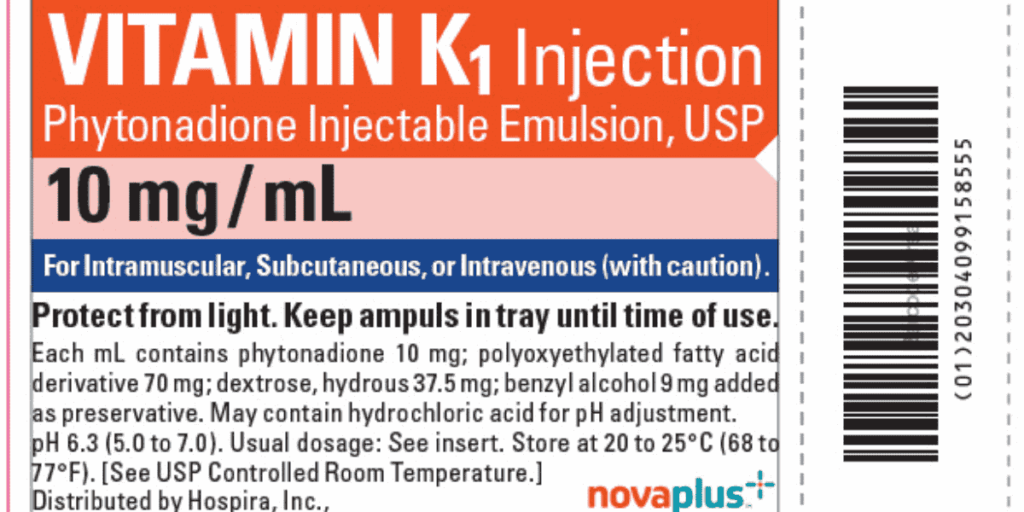Vitamin K Shot at Birth: Pros and Cons
A vitamin K shot at birth is frequently advised by medical professionals to newborns. Parents debate the necessity, advantages, and possible hazards of this treatment, which has grown commonplace in many institutions. In order to assist parents in making educated decisions for their children, we will examine the benefits and drawbacks of giving a vitamin K injection at birth in this post.

Vitamin K: What is it?
A mineral that is essential to our bodies, vitamin K is especially important for blood coagulation. When we sustain cuts or injuries, it aids in the production of proteins that guarantee our blood can clot appropriately and stop excessive bleeding. Vitamin K comes in two major forms:
- Phylloquinone, or vitamin K1, is present in green leafy vegetables such as broccoli, kale, and spinach. This form is critical to our general well-being.
- Animal products and fermented meals include vitamin K2 (menaquinone). It has a major impact on cardiovascular and bone health.
However, vitamin K levels in newborns are extremely low at birth. This is mostly due to the fact that breast milk only contains trace amounts of vitamin K and that it does not successfully pass the placenta. Newborns are more susceptible to Vitamin K Deficiency Bleeding (VKDB) as a result of this lack.
What is VKDB?
VKDB is a condition that can cause babies to bleed excessively. There are three ways it can occur:
Early VKDB: Occurs within the first 24 hours of birth and is typically brought on by the mother’s deficiency in vitamin K.
Classic VKDB: Occurs from one week to six months of age. Breastfed infants who do not receive a vitamin K injection are more likely to have this type.
Between two weeks and six months of age, late VKDB can cause serious consequences, such as brain hemorrhage.
Healthcare professionals advise that all babies have a vitamin K injection as soon as possible after birth in order to prevent VKDB.
Vitamin K shot at birth:
Vitamin K Deficiency Bleeding (VKDB) is a serious condition that can cause profuse bleeding in newborns. The purpose of the vitamin K injection is to avoid this illness. All babies should have a vitamin K shot as soon as possible after birth, according to the American Academy of Pediatrics (AAP).

Pros of Vitamin K Shot:
1.Prevents a lack of vitamin K Bleeding
Preventing VKDB is one of the main goals of vitamin K injections. This disorder can result in potentially fatal bleeding and can happen as early as the first week of life or even later. The chance of this dangerous consequence is greatly decreased by the shot.
2.Instant Absorption
The kid will have sufficient amounts of vitamin K from birth thanks to the vitamin K shot, which delivers an instant boost of the vitamin into the bloodstream. Given that babies cannot generate vitamin K on their own and that the amounts in their food (such as breast milk) are extremely low, this is especially crucial.
3. Durable Impacts
A newborn can be protected for weeks to months with a single vitamin K injection at delivery. This is advantageous since it covers the time frame when there is the greatest risk of VKDB.
4. Secure and Researched
The vitamin K shot’s effectiveness and safety have been assessed in a number of research. The advantages of avoiding VKDB greatly exceed any possible disadvantages, and the technique is usually regarded as safe with little risks.
5.Easy and Fast Management
The vitamin K injection is a quick and easy operation that causes the least amount of disturbance to the newborn and family. Serious health problems later on may be avoided with this prompt care.
6.Parental Peace of Mind
Parents may feel less anxious about possible health problems associated with bleeding disorders if they are reassured that their child has gotten the vitamin K injection.
The Cons of the Vitamin K Shot
1.Injection Pain
The fact that the vitamin K shot requires an injection, which may be uncomfortable for the infant, is one of its most obvious drawbacks. Even though the discomfort is usually only temporary, some parents might be concerned that their baby will feel any pain at all.
2.Potential Reactions to Allergies
The vitamin K injection may cause allergic responses in some newborns, however these are uncommon. Rashes, swelling, or trouble breathing are some of the symptoms. Parents should speak with their pediatrician in advance about any worries they may have.
3.Parental Decisions and Views
Some parents may reject to vaccinations or injections for philosophical or religious reasons. Healthcare professionals should respect these attitudes and inform parents about the advantages of the vitamin K injection.
4.Different Approaches to Administration
Some parents may wonder why a synthetic injection is necessary and prefer natural or alternative methods. As an alternative, they might think about taking vitamin K pills orally. However, research indicates that vitamin K injections may be a more effective way to prevent VKDB than oral supplementation.
5.Ignorance of the Dangers
The dangers of skipping the vitamin K injection are frequently unclear. Some parents may undervalue the severity of VKDB because they believe their child won’t experience it. It is essential to inform parents about the true risks involved. Following figure shows a bruise due to lack of vitamin k in baby.

6.Religious or philosophical objections
Some parents may disagree to vaccines or medical procedures for personal, philosophical, or religious reasons. Healthcare professionals must pay attention to these worries and give fair information regarding the advantages and disadvantages of the vitamin K injection.
6.Financial Issues
The expense of the vitamin K injection may raise issues in some healthcare systems, particularly if parents are already dealing with high postpartum medical expenditures.Nonetheless, as part of standard newborn care, many healthcare systems pay for this expense.
What Do Professionals Suggest?
Medical experts generally agree that the advantages of giving a vitamin K injection at birth greatly exceed the hazards. The vaccination is advised as a routine component of newborn care by groups such as the World Health Organization (WHO) and the American Academy of Pediatrics (AAP).

How Do You Give a Vitamin K Shot?
Usually, an intramuscular injection in the thigh is used to administer the vitamin K shot. The procedure is brief and typically occurs in the initial hours following birth.
What Happens If Parents Vote No?
Parents should have a detailed conversation with their healthcare professional if they choose not to have their newborn receive the vitamin K injection. They must to be aware of the dangers of VKDB and investigate substitutes, like vitamin K taken orally, while assessing the efficacy and possible requirement for additional dosages.
The Value of Making Informed Decisions
When it comes to a newborn’s health, making informed decisions is crucial. Parents should have the confidence to speak with healthcare professionals about their concerns and ask questions. Parents can make the best decision for their family if they are aware of the rationale behind the vitamin K injection and how it can affect their infant’s health.
Factors to Take Into Account:
The necessity of the vitamin K injection may be even more critical if the mother has a history of bleeding disorders or pregnancy difficulties.
Breastfeeding: Vitamin K content in breast milk is low. The vitamin K injection must be taken into consideration if parents intend to nurse their child entirely in order to avoid any possible deficits.
Family History: When considering the vitamin K injection, parents may wish to talk to their healthcare professional about any family history of bleeding issues.
Having Open Discussions
When it comes to the vitamin K shot, parents should feel free to voice their opinions, worries, and any possible objections. By providing precise information and clearing up any misunderstandings, healthcare professionals can assist in directing the discussion
Views on Vitamin K Shot Practices Around the World in Various Countries:
Each nation may administer vitamin K injections at birth in a different way. While some countries have adopted it as regular procedure, others have different practices:
United States: The majority of hospitals adhere to the American Academy of Pediatrics’ strong recommendation that all babies receive a vitamin K injection.
Europe: Although procedures can differ, many European nations also give vitamin K injections. Although the injection is still commonly utilized, some may provide oral vitamin K as an alternative.
Developing Countries: The vitamin K injection may not be regularly administered in some places with poor access to healthcare, which increases the risk of VKDB. In these areas, initiatives are underway to improve practices and educate healthcare personnel.

Conclusion
A crucial preventive step to save neonates from severe bleeding problems is the vitamin K injection. Although the injection has certain issues and disadvantages, the vast majority of the data points to its efficacy and safety.
Parents can make well-informed decisions on the health of their infant by being aware of the pros and cons of vitamin k shot at birth. Parents can make the greatest decision for their newborns with the support of open communication with medical specialists, in-depth risk conversations, and personal views. The ultimate objective is to guarantee each infant a healthy start, laying the groundwork for a prosperous future.
FAQs:
1.Does every baby need to have the vitamin K injection?
Indeed, in order to prevent VKDB, the World Health Organization (WHO) and the American Academy of Pediatrics (AAP) advise that all babies receive a vitamin K injection.
2.When is the shot of vitamin K administered?
Usually given within the first few hours of the baby’s birth, the vitamin K shot is given before the baby leaves the hospital.
3.Which symptoms indicate VKDB?
Unexpected bruising, bleeding from the nose or gums, blood in the stool, abdominal swelling, extreme tiredness, or unusual fussiness are some of the symptoms of VKDB.
4.For what duration does the vitamin K injection offer protection?
During the crucial time when newborns are most vulnerable to bleeding, a single vitamin K injection can offer protection for a few weeks to months.
5.Is there a connection between vitamin K and cancer?
No, a thorough investigation has not revealed a link between vitamin K injections and childhood malignancies. This widespread misconception has been disproven.


